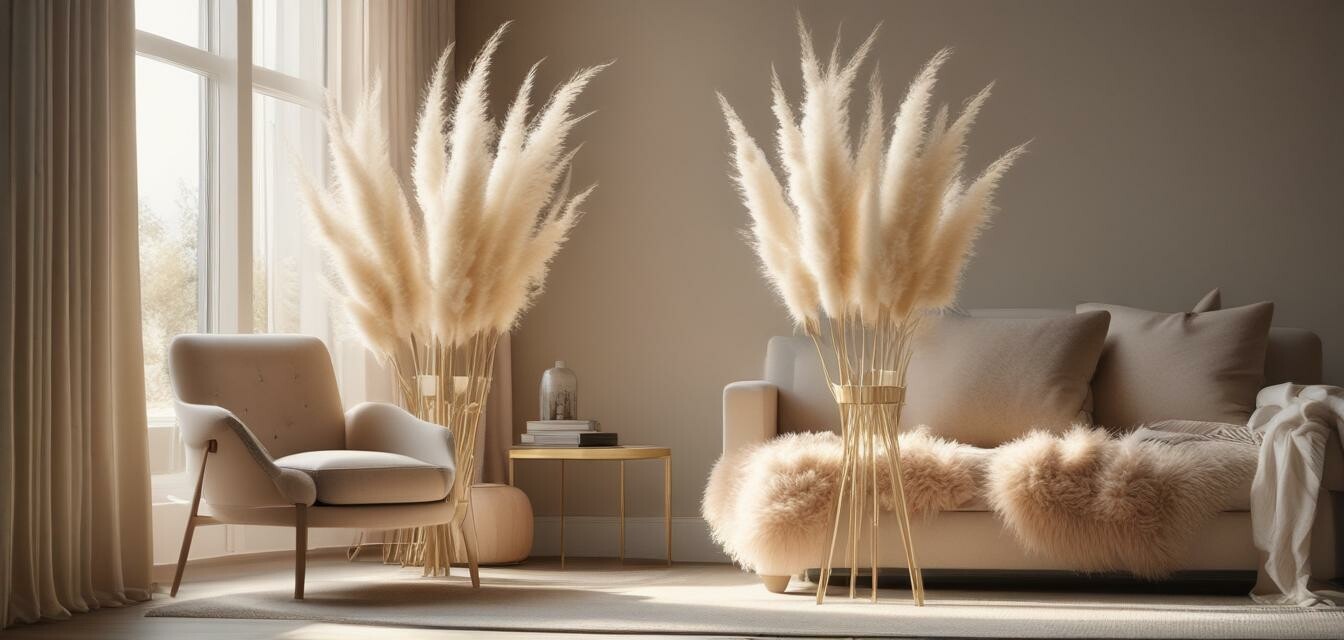
Pampas grass and its role in contemporary photography
- Pampas grass is increasingly popular in photography for its aesthetic appeal.
- It adds texture and depth to compositions.
- Photographers are using pampas grass to create innovative and contemporary arrangements.
- The grass enhances natural lighting effects and sets a tranquil mood.
- Find ways to incorporate pampas grass into your shoots for a unique touch.
Pampas grass has become a staple in contemporary photography, offering unique textures and visuals that can transform a simple scene into an artistic masterpiece. From fashion shoots to styled interiors, photographers are creatively incorporating this natural element to elevate their work. In this article, we will delve into how pampas grass is influencing photography trends and explore its versatile applications.
The allure of pampas grass in photography
Pampas grass, known for its feathery tufts and dramatic height, brings an organic quality to images that can create captivating compositions. Its neutral tones can complement a variety of color schemes, making it a versatile choice for photographers. Let's look at some of the reasons why pampas grass is so sought after:
| Feature | Description |
|---|---|
| Texture | Pampas grass adds a soft, wild texture that contrasts well with hard surfaces. |
| Height | Its tall stalks can create layers in a photograph, guiding the viewer's eye. |
| Color | The natural hues range from cream to soft beige, fitting various palettes. |
| Versatility | Perfect for all styles—from bohemian to minimalist. |
Creative ways photographers are using pampas grass
Photographers are finding innovative methods to use pampas grass. Here are some creative approaches they have taken:
- Frame within a frame: Using pampas grass to create a natural frame around a subject.
- Layering: Combining pampas grass with other elements like fabrics and props for depth.
- Backdrops: Tall pampas grass can serve as a stunning backdrop, enhancing the scene.
- Styled shoots: Incorporating pampas grass into fashion or product styling.
The impact of lighting on pampas grass photography
Light plays a crucial role in photography, and pampas grass can enhance these effects. The way light interacts with the grasses can result in unique photo opportunities:
- Backlighting: Shooting against the light emphasizes the delicate strands and creates a dreamy glow.
- Soft shadows: Pampas grass creates soft shadows, adding depth to images.
- Natural tones: Its neutral colors reflect light beautifully, making editing more straightforward.
Combining pampas grass with other decor elements
Along with its use in photography, pampas grass can complement other decor pieces in stylish setups. Here are some popular decor elements to pair with pampas:
| Decor Element | Complementarity |
|---|---|
| Ceramics | Earthy tones of ceramics match well with the natural look of pampas grass. |
| Textiles | Soft fabrics like linen or cotton create a balanced backdrop. |
| Glass | Transparent elements can highlight the airy feel of pampas grass. |
| Wood | Natural wood tones provide a warm contrast against the soft grass. |
Tips for photographers using pampas grass
Beginners Section
- Start with small arrangements to understand composition.
- Experiment with different lighting setups to showcase textures.
- Don’t shy away from using pampas grass in unconventional ways—let your creativity flow.
- Use a shallow depth of field to focus on the details of the grass.
Conclusion
The rise of pampas grass in contemporary photography is no accident. Its natural beauty, versatility, and ability to enhance various compositions make it an ideal element for photographers looking to create unique works. As this trend continues to grow, understanding how to incorporate pampas grass can elevate your photography and set your work apart. For more insights on how to style with pampas grass, check out our articles on buying guides and pampas grass arrangements!